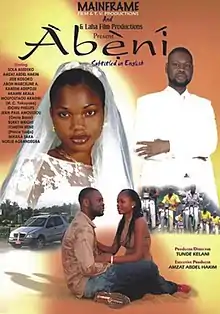Abeni (film)
Abeni is a two-part 2006 Nigerian-Beninese romance film produced and directed by Tunde Kelani.[1][2] It depicts the social divide that occurs as a result of colonialism despite the geographical proximity between Benin and Nigeria.[3]
| Abeni | |
|---|---|
 | |
| Directed by | Tunde Kelani |
| Written by | Yinka Ogun François Okioh |
| Starring | Jide Kosoko Kareem Adepoju Abdel Amzat Bukky Wright |
Production companies | Dove Media, Laha Productions Mainframe Film and Television Production |
| Distributed by | Mainframe Film and Television Productions |
Release date |
|
Running time | 98 minutes |
| Countries | Nigeria Benin |
| Languages | Yoruba French |
Plot
Abeni follows the story of the eponymous Abeni who was born with a silver spoon. She meets Akanni who hails from a more modest background. They are engaged to be married to other people but their meeting changes the course of already set plans.
Cast
- Kareem Adepoju as Baba Wande
- Abdel Hakim Amzat as Akanni
- Sola Asedeko as Abeni
- Amzat Abdel Hakim as Akanni
- Jide Kosoko as Abeni's father
- Bukky Wright
Production and release
Abeni was set in Yoruba-speaking areas of Nigeria and Cotonu. It employed the methods of Code-Switching, Code-Mixing and Code-Conflicting as it involved two languages and depicts how the characters overcame language barrier by paying close attention and employing the use of gesticulations.[2][4]
It was a joint production between Mainframe Film and Television Productions and Laha Productions.[5] It was released on 31 March 2006 with physical copies selling in post offices, banks and fast food joints.[6]
Critical reception
In a review for The Nation, Victor Akande wrote "With hilarious sub-plots woven through the core story of love lust and regains, this is a fascinating portrait of the Yoruba urban middle class that flows between Nigeria and Republic of Benin."[1]
The film was nominated in 11 categories at the 3rd Africa Movie Academy Awards and won in 2 of the categories.[7]
Awards and nominations
| Year | Award | Category | Result | Ref |
|---|---|---|---|---|
| 2007 | Africa Movie Academy Awards | Best Sound | Won | [7] |
| Best Film in an African Language | Nominated | |||
| Best Nigerian Film | Nominated | |||
| Best Cinematography | Nominated | |||
| Best Indigenous Film | Nominated | |||
| Best Performance by Child - Samuel Olaseinde | Won | |||
| Best Edit | Nominated | |||
| Best Upcoming Artiste - Amzat Abdel Hakim | Nominated | |||
| Best Actress in Supporting Role - Noelie Funmi Agbendegba | Nominated | |||
| Best Director - Tunde Kelani | Nominated | |||
| Best Picture | Nominated | |||
| Nigerian Movie Awards | Won | [1] |
References
- Akande, Victor (2007-04-28). "Movie Review: Abeni". The Nation (Nigeria). Archived from the original on 2014-10-31. Retrieved 31 October 2014.
- Iyiola, Amos Damilare (2021-01-17). "Code-Switching, Code-Mixing and Code-Conflicting in Abeni by Tunde Kelani". KIU Journal of Humanities. 5 (4): 169–174. ISSN 2522-2821.
- Ogunleye, Foluke (2014-03-17). African Film: Looking Back and Looking Forward. Cambridge Scholars Publishing. ISBN 978-1-4438-5749-9.
- Soetan, Olusegun (2019-01-01). "The Hearthstone: Language, Culture, and Politics in the Films of Tunde Kelani". Polymath: An Interdisciplinary Arts and Sciences Journal. 8 (2): 1–26. ISSN 2153-4314. Archived from the original on 2021-11-30. Retrieved 2021-07-11.
- Afolabi, Omoniyi (2011). "Yoruba Films By Tunde Kelani: Primary Cultural And Linguistic Data Collection" (PDF). Archived from the original (PDF) on 2021-10-14. Retrieved 2021-07-11 – via Center for Open Educational Resources and Language Learning (COERLL) at the University of Texas at Austin.
{{cite journal}}: Cite journal requires|journal=(help) - "Abeni... love across borders". Nigerian Voice. Retrieved 2021-07-11.
- "Africa Celebrates Film Industry at AMAA 2007 - Mshale News". 2012-03-03. Archived from the original on 2012-03-03. Retrieved 2021-07-11.
Further reading
- World Cinema versus Subjectivity: How to Read Tunde Kelani's Abeni Author(s): Kenneth W. Harrow Source: Black Camera, Vol. 5, No. 2 (Spring 2014), pp. 151–167 Published by: Indiana University Press